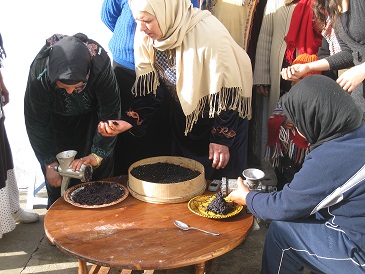Sustainable forestry: creating jobs, benefiting rural communities, advancing gender equality

Related topics
Agriculture & Forestry Innovation International cooperation Belgium Italy Spain Morocco Tunisiadate: 04/06/2015
Project: Mediterranean Network of Forestry Resear...
acronym: MENFRI
See also: CORDIS
At present, many rare and endangered species found in Mediterranean forests are threatened with extinction because of climate change. This could have catastrophic consequences for local communities reliant on forest-based products.
“In Maghreb countries, the overexploitation of forest resources, together with predicted temperature increases and precipitation decreases, will increase the risk of desertification,” explains Enrique Doblas Miranda, scientific coordinator of the Centre de Recerca Ecològica i Aplicacions Forestals (CREAF), Spain.
“This overexploitation is resulting in the loss of valuable raw materials and resources for dependent populations. If innovative smart strategies can be applied, then these forests could still be managed for use, but in a renewable way.”
Creating jobs while combating climate change: a sustainable future
The project has shown that sustainable and economically beneficial forestry is possible. In Europe, where land abandonment is a key issue, responsible forest tourism is being encouraged as a way to bring economic benefits to local communities while promoting forest conservation.
“Studies also support the use of alternative – and highly profitable – forest resources such as mushrooms, cork and aromatics. Also, forest owners’ associations play a key role by favouring forest product certification,” says Doblas.
In Africa, MENFRI is encouraging local women’s associations to start marketing non-wood products including pine nuts, argan oil (used in the cosmetics industry) and carob tree fruit. “The potential benefits are huge, ranging from increased income to general community development in terms of education, health, gender equality and wellbeing,” adds Doblas.
MENFRI is currently in negotiations with the Programme for the Endorsement of Forest Certification (PEFC), the world’s largest forest certification system, to encourage the certification of more forest-based products at a regional and global level.
Making the world of difference
Doblas believes there are two key issues that set the MENFRI project apart. “First, environmental research projects often forget about the applicability of their results,” he says. “We can publish hundreds of papers on tackling global change, but no one will read them if forest owners have no money to put these methods into practice. This is why MENFRI aims to make all research available, while addressing the causes of untapped potential in the Mediterranean.”
Second, MENFRI is an innovation project closely related to rural and local development, and is fully engaged with issues such as poverty and gender equality. “International organisations, such as the FAO and the Union for Mediterranean, have shown an interest in a number of MENFRI initiatives,” he adds.
The activities put forward by MENFRI, which is due for completion in November 2016, represent the first step in overcoming underdevelopment in the Mediterranean forestry sector, promoting job opportunities by unleashing innovative solutions. “These natural resources should be fundamental to helping local communities escape financial dependency (for example, being reliant on just one unsustainable crop) and start moving towards sustainable development,” concludes Doblas.
Check also our publication Investing in European success - EU-Africa cooperation in science, technology and innovation
